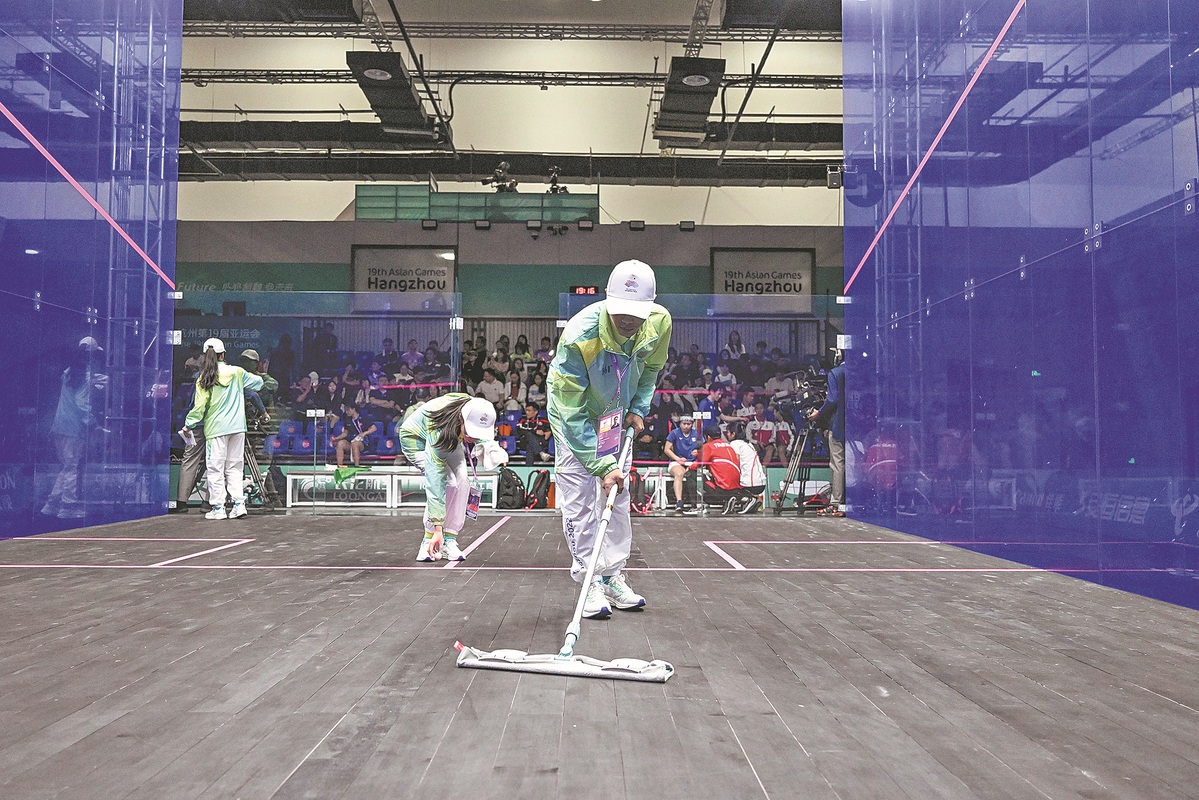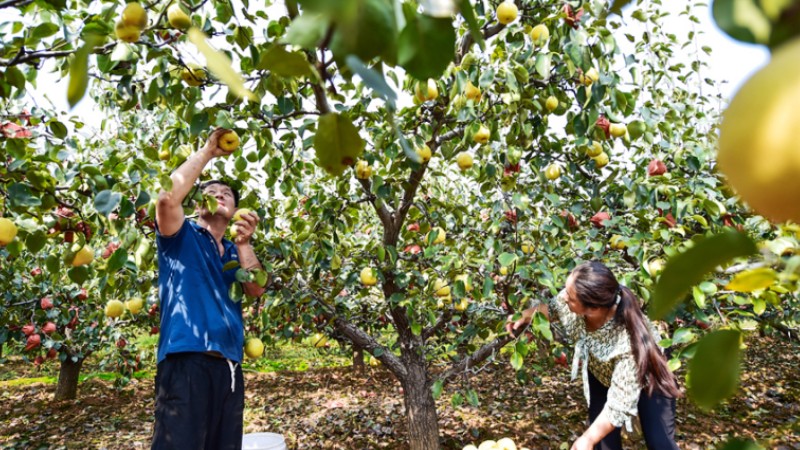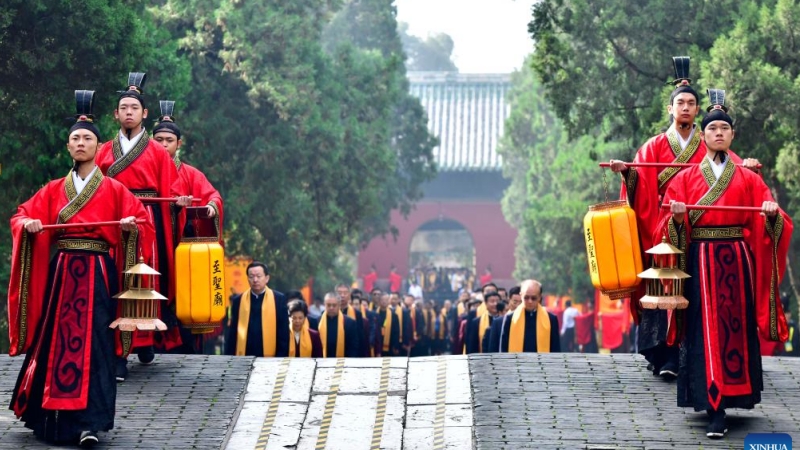Hong Kong volunteers rise to occasion at Asian Games

Basketball player Wang Xinyu greets volunteers during a match at the Asian Games in Hangzhou, Zhejiang province. CHEN BIN/XINHUA
Compatriots from Macao and Taiwan also play vital part
Chloe Ho Pui-pui had no hesitation in making a special trip from Hong Kong to Hangzhou, the capital of Zhejiang province, to act as a volunteer for the 19th Asian Games, which ended on Sunday.
"For an event of this international stature and significance, the question shouldn't be why should I take part in it, but why not," she said.
Born in 1985, Ho used to work in banking, but after becoming tired of the job, she became an officer in the Hong Kong Police Force.
Wearing a high ponytail, walking quickly and talking fast, she exemplifies the image of a Hong Kong policewoman often seen in the city's movies and television dramas.
In March, after hearing that the Hong Kong Island Women's Association, a leading charity organization, was recommending local residents to work as volunteers at the Asian Games, Ho was the first to step forward.
Ho said: "There is usually a gap of several years between events on the scale of the Asian Games. Life is short, and as I'm not that young, I could not miss out this time."
Since March, Ho devoted all her spare time to prepare for being a volunteer.
She first passed an interview with the association, before undergoing a training course at Tuen Mun Public Riding School, which is managed by the Hong Kong Jockey Club.

Volunteers work at the media center during the Games. XIE SHANGGUO/FOR CHINA DAILY
During the training, Ho had her first experience of entering a stable and getting up close to horses, allowing her to gain firsthand knowledge about stable operations, horse nutrition and equine routines.
Following requirements set by the Asian Games Organising Committee, she completed online classes, studied relevant material, passed exams, and was finally selected as a volunteer after several months of preparatory work.
Last month, with the support of her colleagues, and using her accumulated leave, Ho freed up time in her work schedule for her voluntary duties.
She arrived in Hangzhou on Sept 19, staying in a hotel about a 50-minute drive from the Tonglu Equestrian Centre, which hosted the Asian Games equestrian events.
Every day, Ho rose at 4 am to ensure she arrived at the competition venue by about 6 am to begin work two hours later. She was often busy until late in the evening, sometimes until 11 pm or midnight, frequently only managing to get about five hours' sleep each day.
Ho was responsible for providing services as an English-language interpreter. She helped athletes, technicians and staff members from different countries and regions to communicate with each other.

Volunteers pose with one of the mascots for the Games. ANDY CHONG/CHINA DAILY
Marked similarities
She said much of her time was spent working in the stables at the center.
When she first visited the stables, Ho experienced a sense of familiarity.
"There are marked similarities between the stables in Tonglu and those in Tuen Mun in terms of facilities and infrastructure," she said.
After learning that the Hong Kong Jockey Club provided technical support for the Tonglu Equestrian Centre's development, Ho said she developed a deeper understanding of the cooperation between Hong Kong and the Chinese mainland.
Her main responsibility was to help two horseshoers from the United Kingdom communicate with staff members from the mainland.
Ho said identifying the different hoof-trimming tools is difficult, as they look similar and have complicated English names.
The horseshoers took time to write down the names of these tools on a whiteboard, comparing them with other objects to teach Ho to identify them. "It took me a day to familiarize myself with the terminology," she said.
Ho said the two Britons had a great sense of humor. To foster a happy working atmosphere, they asked her to write down quotes and jokes, and make drawings and doodles on the whiteboard, changing them every day. As the motto for her first day at the equestrian center, she wrote, "Life doesn't have to be perfect to be wonderful."
During the first few days of the equestrian events, the weather was hot and some people experienced heatstroke. Ho was called in to help in the medical room, and when volunteers welcoming guests in the VIP room fell ill, she also stepped in to provide assistance.
In addition, she was asked to communicate with an expatriate guest regarding the rehearsal for a medal awards ceremony.
"My role was to be on call and ready to go wherever I was needed. I ran around the center, routinely taking 10,000 steps each day," Ho said, adding that she cherished the most the friendships she formed with her fellow volunteers.

Hurdles are placed by volunteers for an event at the Games. JIANG WENYAO/XINHUA
At the center, 27 volunteers from Hong Kong, who didn't know one another before arriving in Hangzhou, were each assigned different tasks. Ho made efforts to unite them together.
She brought badges from Hong Kong to share with the mainland volunteers. As they were particularly interested in the Hong Kong police due to the force's portrayal in TV dramas, she patiently answered their questions about her work.
In her first few days in Hangzhou, Ho struggled to adapt to the climate, slept badly, and always needed to shout to make herself heard in noisy conditions. As a result, her voice became hoarse, and one day she had difficulty speaking.
Her friends were quick to offer her all the medicine they had, and some even ordered takeout food for Ho.
In the afternoon on National Day, when no competitions were scheduled, the organizing committee arranged a celebratory party for the volunteers, during which they were invited to perform on stage. Some danced, some sang, and others recited poetry.
The Hong Kong rock band Beyond was the inspiration for Ho's songs, and her solo act was quickly joined by her friends. Together, they waved their hands in time to the music.
"I felt that we were a big family at that time," Ho said.

Volunteers clean a squash court before a match. CHEN YEHUA/XINHUA
Hard to leave
As the end of her voluntary service approached, Ho said she could not imagine having to leave Hangzhou.
"I thought I would have mixed emotions," she said, adding that her volunteer experience would hold a special place in her heart and be one of the most beautiful memories of her life.
Wang Jie, director of the Hangzhou Asian Games Organizing Committee's volunteer department, said that throughout the Games, the volunteers from Hong Kong, Macao and Taiwan demonstrated exceptional selflessness and dedication.
There was an overwhelming response to the volunteer recruitment process during the preparatory period, with about 317,000 people applying.
A total of 37,600 volunteers were chosen from this pool for various tasks, including language services, reception work, technical support and venue maintenance throughout the Games.
Volunteers were known as "little green lotuses," a term inspired by the color of their uniforms. The nickname symbolized their role as the "vibrant power" behind the scenes and also reflected the deep affection people held for them.
Wang said 60 "little green lotuses "were from Hong Kong, four came from Macao, and eight from Taiwan.
Among the 60 from Hong Kong, 29 were recommended by the University of Hong Kong and Hong Kong University of Science and Technology. They worked at the Hangzhou Olympic Sports Centre Tennis Centre. In addition, 27 volunteers were recommended by two social organizations — the Hong Kong Federation of Youth Groups and the Hong Kong Island Women's Association. They provided services at the Tonglu Equestrian Centre.
Most of the volunteers from Macao and Taiwan were university students studying on the mainland, who were recruited through open enrollment.
Volunteers from Hong Kong, Macao and Taiwan with relatively good language skills often worked as receptionists or translators.
Wang said he was touched by the volunteers' personal stories and their willingness to serve.
For example, Lam Ho-fung, who works for the MTR Corp, the sole rail operator in Hong Kong, previously volunteered for international events 18 times, including the 2008 Beijing Olympic Games and the 2010 Asian Games in Guangzhou, capital of Guangdong province.
After learning that the 19th Asian Games would be held in Hangzhou, Lam traveled to the city from Hong Kong, aptly becoming a volunteer for the 19th time.
Wang said that after interacting with the volunteers from Hong Kong, Macao and Taiwan, he felt their strong sense of national identity, adding that they were proud to contribute to a large-scale event being staged by China.
He said these volunteers exhibited a proactive and open attitude when interacting with others. Many of them who have sports hobbies had a more professional understanding of international events, he said.
Some of these volunteers underwent training before arriving in Hangzhou, highlighting their commitment to Asian Games, Wang added.
Residents of Hong Kong, Macao and Taiwan face additional challenges in performing voluntary work, including coordinating their time, managing their work and studies, and dealing with travel problems, Wang said. He expressed deep gratitude to these volunteers for overcoming such obstacles and wholeheartedly contributing to the Asian Games.
He said that in addition to the Asian Games, Hangzhou has hosted various large-scale events, such as the G20 Summit and the China International Cartoon Animation Festival. It will also stage the Global Digital Trade Expo next month.
Wang said he hoped the Asian Games would serve as a catalyst to foster more communication and exchanges between Hangzhou, Hong Kong, Macao and Taiwan.
"We would welcome residents from Hong Kong, Macao and Taiwan visiting Hangzhou more often in the future," he added.
Photos
Related Stories
- Highlights of African Shooting Championship
- Touching moments at Hangzhou Asian Games
- Petar Porobic, head coach of China's men’s water polo dies on flight back home to Montenegro after Asian Games
- Hong Kong uniquely placed to add value to RCEP members: HKSAR chief executive
- Highlights of Hangzhou Asian Games
- High-speed rail links HK with new destinations
Copyright © 2023 People's Daily Online. All Rights Reserved.









